

Bringing PEACE to the Classroom. One of the most intriguing, and perhaps intimidating, aspects of walking into a class for the first time and introducing yourself is deciding who you will be.
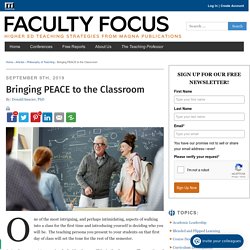
The teaching persona you present to your students on that first day of class will set the tone for the rest of the semester. As teachers, we get to consciously decide who we will be in the classroom. The creation of our teaching personas deserves careful consideration and is something I frequently discuss with my graduate students prior to their first teaching opportunity. In reflecting on the evolution of my teaching persona over the last two decades, and in discussing how my colleagues have developed and refined their own teaching personas, I offer an overarching recommendation for the basic elements of a teaching persona that will enhance the engagement of the teachers and students and contribute to a vibrant community of teachers and learners in the classroom. Five Lessons Online Faculty Can Learn from the IRS. Another Tax Day is upon us.
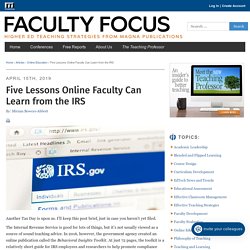
I’ll keep this post brief, just in case you haven’t yet filed. The Internal Revenue Service is good for lots of things, but it’s not usually viewed as a source of sound teaching advice. In 2016, however, the government agency created an online publication called the Behavioral Insights Toolkit. At just 72 pages, the toolkit is a relatively short guide for IRS employees and researchers to help promote compliance and improve taxpayer engagement by leveraging strong communication practices. FF Special Report faculty development 10 2018.
Five Keys to Motivating Students. Ideas for Creating an Effective Syllabus for Online Learning. Online students need to feel an instructor presence in their classes.
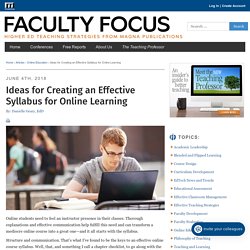
Thorough explanations and effective communication help fulfill this need and can transform a mediocre online course into a great one—and it all starts with the syllabus. Structure and communication. How a Course Map Puts You on Track for Better Learning Outcomes. Higher Ed Teaching & Learning. Six Myths About a Teaching Persona. What myths about constructing a teaching persona merit review?
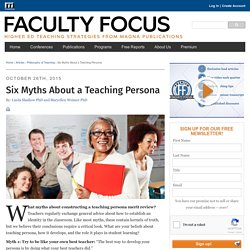
Teachers regularly exchange general advice about how to establish an identity in the classroom. Like most myths, these contain kernels of truth, but we believe their conclusions require a critical look. What are your beliefs about teaching persona, how it develops, and the role it plays in student learning? Myth 1: Try to be like your own best teacher: “The best way to develop your persona is by doing what your best teachers did.”What if your best teacher isn’t at all like you as a person? Facilitating Discussion: Five Factors that Boost Student Engagement. It’s another of those phrases frequently used and almost universally endorsed but not much talked about in terms of implementation.
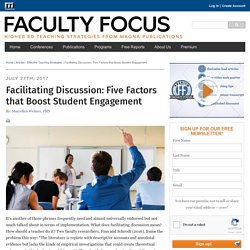
What does facilitating discussion mean? How should a teacher do it? Two faculty researchers, Finn and Schrodt (2016), frame the problem this way: “The literature is replete with descriptive accounts and anecdotal evidence but lacks the kinds of empirical investigations that could create theoretical coherency in this body of work” (p. 446). They decided our understanding of discussion facilitation could be deepened with an operational definition, one that resides in an instrument to measure it quantitatively.
Beyond developing and validating the instrument, they wondered what learning-related outcomes does discussion facilitation accomplish. Developing the instrument was the first task. Helping Students Develop Critical Information Processing Skills. The wealth of digital information has shifted our focus in higher education from developing critical thinking skills to developing critical information processing skills.
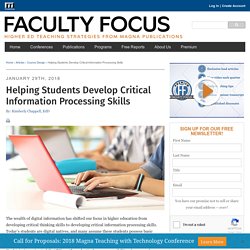
Today’s students are digital natives, and many assume these students possess basic research skills because of their natural ease with technology. However, many college students lack important information processing skills to understand electronic material. Grafstein (2002) noted that “Given the seductively easy accessibility of masses of unregulated information, it is imperative that students, from the very beginning of their academic careers, adopt a critical approach to information and develop the ability to evaluate the information they encounter for authenticity, accuracy, credibility, authority, relevance, concealed bias, logical inconsistency, and so on” (p. 199).
Although most agree these skills are needed by students, rarely are these skills taught within the context of a typical college or university course. Nine Tips for Creating a Hybrid Course - Faculty Focus. October 29th, 2008.
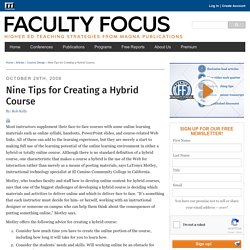
Seven Guidelines for Designing Effective Course Pages for the Online Classroom. June 18th, 2013 By: Rob Kelly The design of your course pages can have a significant effect on the learning experience in your online course.
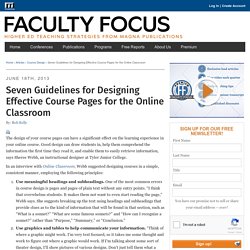
Good design can draw students in, help them comprehend the information the first time they read it, and enable them to easily retrieve information, says Sheree Webb, an instructional designer at Tyler Junior College. In an interview with Online Classroom, Webb suggested designing courses in a simple, consistent manner, employing the following principles: Scaffolding Student Learning: Tips for Getting Started. Many of us who teach in higher education do not have a teaching background, nor do we have experience in curriculum development.
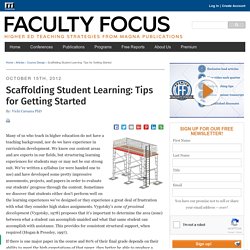
Gmail - Free Storage and Email from Google. Gmail - Free Storage and Email from Google. Teaching Adult Students with Considerable Professional Expertise. Trends toward increased enrollment of non-traditional students are expected to continue (Stringer, 2015).
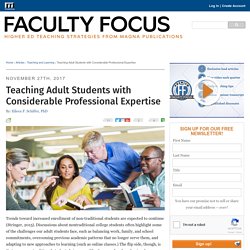
A Simple Trick for Getting Students to Ask Questions in Class. Your students have questions, but they rarely ask them—especially at the beginning of the semester. They feel awkward or embarrassed, or maybe it’s just inertia. Whatever the cause, the vast majority of student questions go unasked. For teachers, this is wildly frustrating because we can’t answer the questions they don’t ask (though some questions can be anticipated). Designing Developmentally: Simple Strategies to Get Students Thinking. I continue to be concerned that we don’t design learning experiences as developmentally as we should. What happens to students across a course (and the collection of courses that make up a degree program) ought to advance their knowledge and skills.
Generally, we do a good job on the knowledge part, but we mostly take skill development for granted. We assume it just happens, and it does, sort of, just not as efficiently and extensively as it could if we purposefully intervened. Perhaps it would help if we had some concrete examples illustrating how assignments and activities can be designed so that skills are developed. Kathie L. The approach has multiple benefits.
Another benefit to this approach is that the questions themselves can be used, not just to debrief good answers (or with certain content, correct answers) but to explore different kinds and levels of questions. How Good Are Your Discussion Facilitation Skills? Successfully leading and guiding student discussions requires a range of fairly sophisticated communication skills. At the same time teachers are monitoring what’s being said about the content, they must keep track of the discussion itself. Jedi Training: Developing Habits of Perception in Our Disciplines. Moving from Silos and Burnout to Community and Engagement. Online Facilitation.